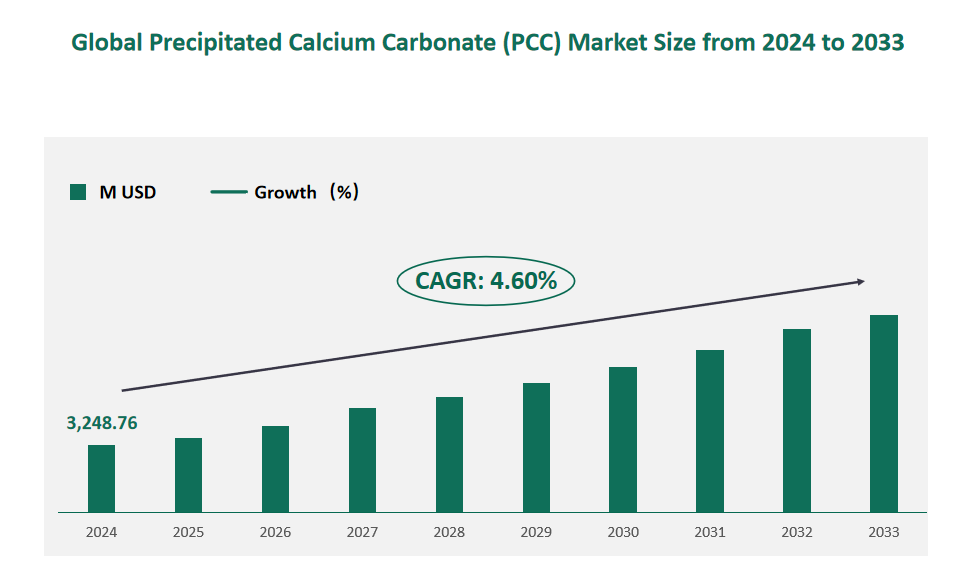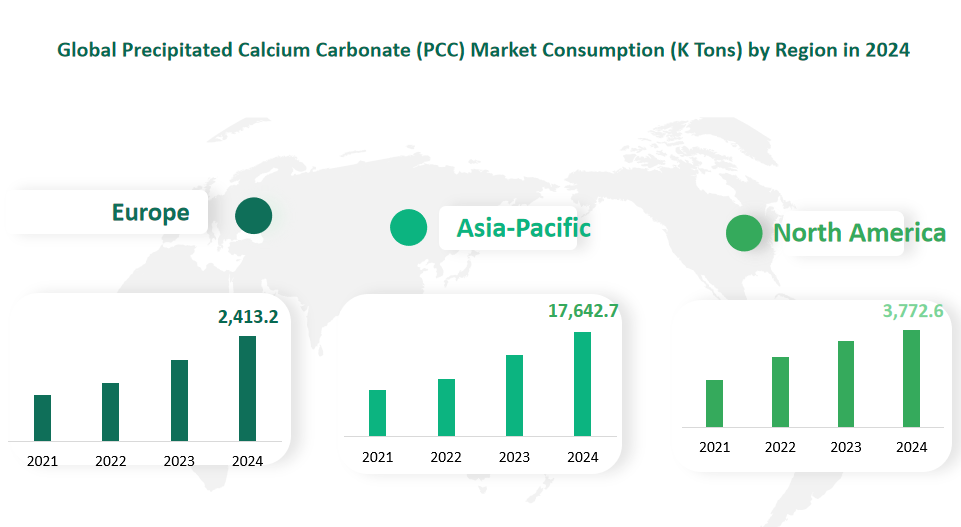1 Global Precipitated Calcium Carbonate (PCC) Market Size (Value) and CAGR (2024-2033)
In 2024, the global Precipitated Calcium Carbonate (PCC) market was valued at USD 3,248.76 million, with a CAGR of 4.60% from 2024 to 2033.
Precipitated calcium carbonate (PCC), also known as purified, refined or synthetic calcium carbonate, is an innovative product derived from lime with many industrial applications. PCC is made by hydrating high-calcium quicklime and then reacting the resulting slurry or “milk of lime” with carbon dioxide. As long as PCC meets certain purity requirements, it can be used as a direct food additive, as an indirect additive in pharmaceuticals, or in paper products that come into contact with food.
Figure Global Precipitated Calcium Carbonate (PCC) Market Size (M USD) and CAGR 2024-2033

2 Precipitated Calcium Carbonate (PCC) Market Drivers
The global Precipitated Calcium Carbonate (PCC) market is experiencing robust growth driven by several key factors that are enhancing its demand across various industries. One of the primary drivers is the increasing demand from the paper industry, where PCC is used as a filler to improve paper brightness, reduce costs, and enhance printability. As the global paper industry continues to grow, particularly in emerging economies, the need for high-quality fillers like PCC is also rising.
Another significant driver is the expanding plastics industry. PCC is used as a reinforcing filler and cost-effective alternative to more expensive resins, helping to reduce production costs while improving the mechanical properties of plastic products. This is particularly important as the plastics industry seeks to balance cost efficiency with performance requirements. The growing demand for lightweight and durable plastics in automotive, packaging, and consumer goods sectors further fuels the market for PCC.
The paints and coatings industry also plays a crucial role in driving PCC market growth. PCC is used as an extender and opacifier in paints and coatings, enhancing their performance and reducing raw material costs. With the global construction industry on an upward trajectory, driven by urbanization and infrastructure development, the demand for paints and coatings—and consequently PCC—is expected to increase significantly.
3 Precipitated Calcium Carbonate (PCC) Market Restraints and Challenges
One of the primary challenges is the stringent environmental regulations governing the mining and processing of calcium carbonate. Mining activities can generate significant environmental impacts, including acidic mine drainage, waste rock, and air pollution. As a result, regulatory bodies have imposed strict laws to mitigate these effects, which can increase production costs and regulatory compliance burdens for PCC manufacturers.
Fierce market competition is also a major constraint. The PCC industry is characterized by a high degree of product homogeneity, leading to fierce competition among major players. This competition often results in price wars, which can compress profit margins and limit the market’s overall growth. Additionally, the dominance of a few large players, such as Minerals Technologies, Omya, and Imerys, makes it difficult for new entrants to establish a foothold in the market, further intensifying competitive pressures.
The market also faces challenges related to the side effects of excessive calcium carbonate consumption. In the pharmaceutical industry, for example, the overuse of calcium carbonate can lead to health issues such as hypercalcemia and gastrointestinal discomfort. These concerns may limit the application of PCC in certain high-purity pharmaceutical formulations, thereby constraining market growth in this sector.
4 Global Precipitated Calcium Carbonate (PCC) Market Size and Share by Type in 2024
Pharmaceutical Grade PCC is characterized by its high chemical purity, typically exceeding 98%. This grade is specifically designed for use in the pharmaceutical and food industries, where purity and safety are paramount. It serves as a neutralizer, buffer, and calcium source in various formulations, including tablets, syrups, and nutritional supplements. In 2024, the revenue generated by Pharmaceutical Grade PCC is expected to reach $626.12 million USD, accounting for approximately 19.27% of the total market revenue. This segment is driven by the increasing demand for high-purity calcium carbonate in pharmaceutical formulations and nutritional supplements, particularly in regions with growing health-conscious populations.
Industrial Grade PCC, which has a chemical purity of over 90%, is the dominant segment in the market. This type is further divided into Ordinary PCC and Ultrafine PCC, each tailored for specific industrial applications. Industrial Grade PCC is widely used in the paper, plastics, paints, and coatings industries due to its ability to enhance product properties while reducing costs. In 2024, the revenue from Industrial Grade PCC is projected to be $2,622.64 million USD, representing 80.73% of the total market revenue. The growth of this segment is primarily driven by the expanding paper and plastics industries, which rely on PCC as a cost-effective filler and performance enhancer.
Table Global Precipitated Calcium Carbonate (PCC) Market Size and Share by Type in 2024
Type | Market Size (M USD) 2024 | Market Share 2024 |
Pharmaceutical Grade | 626.12 | 19.27% |
Industrial Grade | 2622.64 | 80.73% |
5 Global Precipitated Calcium Carbonate (PCC) Market Size and Share by Application in 2024
The paper industry is the largest consumer of PCC, utilizing it as a filler to improve paper brightness, reduce production costs, and enhance printability. In 2024, the revenue generated from PCC used in the paper industry is expected to reach $1,147.93 million USD, accounting for approximately 35.33% of the total market revenue. The growth in this segment is driven by the increasing demand for high-quality paper products, particularly in emerging economies where urbanization and industrialization are on the rise.
The plastic industry is another significant consumer of PCC, using it as a reinforcing filler and cost-effective alternative to more expensive resins. PCC enhances the mechanical properties of plastics while reducing production costs. In 2024, the revenue from PCC used in the plastic industry is projected to be $1,056.67 million USD, representing 32.53% of the total market revenue. The growth in this segment is fueled by the expanding automotive, packaging, and consumer goods sectors, which require lightweight and durable plastic materials.
PCC is widely used in the paints and coatings industry as an extender and opacifier, enhancing the performance of paints while reducing raw material costs. In 2024, the revenue generated from PCC in this industry is expected to reach $274.91 million USD, accounting for 8.46% of the total market revenue. The growth in this segment is driven by the global construction industry, which continues to expand due to urbanization and infrastructure development.
PCC is used in adhesives and sealants to improve their rheological properties and enhance performance. In 2024, the revenue from PCC in this application is projected to be $115.37 million USD, representing 3.55% of the total market revenue. The growth in this segment is driven by the increasing demand for high-performance adhesives and sealants in various industrial applications, including automotive and construction.
Table Global Precipitated Calcium Carbonate (PCC) Market Size and Share by Application in 2024
Application | Market Size (M USD) 2024 | Market Share 2024 |
Paper Industry | 1147.93 | 35.33% |
Plastic Industry | 1056.67 | 32.53% |
Paints & Coatings Industry | 274.91 | 8.46% |
Adhesives & Sealants | 115.37 | 3.55% |
Other | 653.88 | 20.13% |
6 Global Precipitated Calcium Carbonate (PCC) Market Consumption (K Tons) by Region in 2024
The Asia-Pacific region is the largest consumer of PCC, driven by rapid industrialization, urbanization, and growing downstream demand. In 2024, the region is expected to consume 17,642.7K Tons of PCC. China and India are the primary drivers of growth in this region, with significant demand from the paper, plastics, and construction industries. The region’s economic development and technological advancements further support the growth of the PCC market.
North America is the second-largest consumer of PCC, with significant demand from the paper, plastics, and pharmaceutical industries. In 2024, the region is projected to consume 3,772.6 K Tons of PCC. The United States is the primary market driver, supported by robust industrial demand and technological innovation.
Europe is another significant consumer of PCC, with demand driven by the paper, plastics, and paints & coatings industries. In 2024, the region is expected to consume 2,413.2 K Tons of PCC. The growth in this region is supported by regulatory standards and technological advancements, particularly in the automotive and construction sectors.
Figure Global Precipitated Calcium Carbonate (PCC) Market Consumption (K Tons) by Region in 2024

7 Major Players in Global Precipitated Calcium Carbonate (PCC) Market
7.1 Minerals Technologies
Company Profile:
Minerals Technologies Inc. is a leading global producer of specialty mineral products, including Precipitated Calcium Carbonate (PCC). Established in 1853, the company is headquartered in the United States and operates worldwide. Minerals Technologies is renowned for its innovative approach to mineral processing and its commitment to sustainability and technological advancement.
Business Overview:
Minerals Technologies operates in three main segments: Performance Materials, Specialty Minerals, and Refractories. The company’s Specialty Minerals division is particularly notable for its production of PCC, which is used in various industries such as paper, plastics, and pharmaceuticals. The company’s global presence and extensive product portfolio enable it to serve a wide range of customers across different regions.
Product Portfolio:
Minerals Technologies offers a diverse range of PCC products, tailored to meet the specific needs of different industries. Their PCC products are known for their high purity and consistent quality, making them suitable for applications in paper filling, plastic compounding, and pharmaceutical formulations. The company also provides customized solutions to address unique customer requirements.
Recent Financial Performance:
In the most recent year, Minerals Technologies reported a revenue of 450.93 million USD from its PCC operations. The company achieved a gross margin of 24.32%.
7.2 Omya
Company Profile:
Omya is a leading global producer of industrial minerals, primarily calcium carbonate and dolomite. Established in 1884, the company is headquartered in Switzerland and operates worldwide. Omya is known for its high-quality products and innovative solutions, catering to a wide range of industries.
Business Overview:
Omya’s business is centered around the production and distribution of specialty minerals and chemicals. The company’s PCC products are used in various applications, including paper, plastics, paints, and pharmaceuticals. Omya’s global network of production facilities and distribution centers enables it to provide reliable supply and service to its customers.
Product Portfolio:
Omya offers a comprehensive range of PCC products, each designed to meet specific industry requirements. Their PCC products are characterized by high purity, consistent particle size, and excellent performance. Omya also provides customized solutions to enhance product performance and meet unique customer needs.
Recent Financial Performance:
In the most recent year, Omya reported a revenue of $315.23 million USD from its PCC operations. The company achieved a gross margin of 24.74%.
7.3 Imerys
Company Profile:
Imerys is a world leader in mineral-based specialty products, with a strong focus on innovation and sustainability. Established in 1880, the company is headquartered in France and operates globally. Imerys is known for its high-quality products and commitment to environmental responsibility.
Business Overview:
Imerys operates in several segments, including Performance Minerals, Functional Minerals, and High-Temperature Solutions. The company’s PCC products are used in various applications, such as paper, plastics, and construction materials. Imerys’ global presence and extensive product portfolio enable it to serve a wide range of customers across different regions.
Product Portfolio:
Imerys offers a diverse range of PCC products, each tailored to meet specific industry needs. Their PCC products are known for their high purity, consistent quality, and excellent performance. Imerys also provides customized solutions to enhance product performance and meet unique customer requirements.
Recent Financial Performance:
In the most recent year, Imerys reported a revenue of $200.67 million USD from its PCC operations. The company achieved a gross margin of 27.44%.

